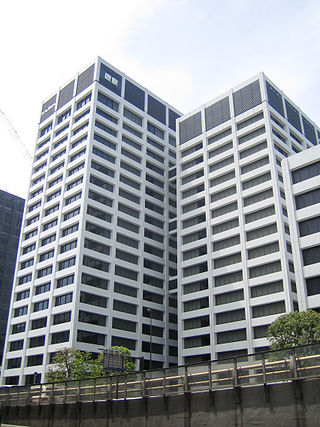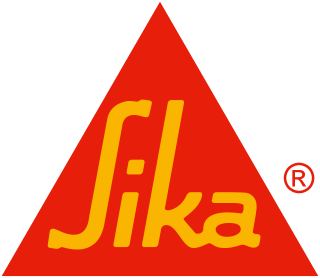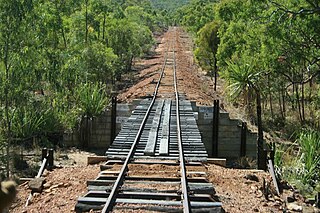Related Research Articles
Hyundai Group is a South Korean conglomerate founded by Chung Ju-yung. The group was founded in 1947 as a construction company. With government assistance, Chung and his family members rapidly expanded into various industries, eventually becoming South Korea's second chaebol. Chung Ju-yung was directly in control of the company until his death in 2001.
HD Hyundai Heavy Industries is the world's largest shipbuilding company and a major heavy equipment manufacturer. Its headquarters are in Ulsan, South Korea.
Sumitomo Corporation is one of the largest worldwide sōgō shōsha general trading companies, and is a diversified corporation. The company was incorporated in 1919 and is a member company of the Sumitomo Group.

Hyundai Rotem is a South Korean company that manufactures rolling stock, defense products and plant equipment. It is a part of the Hyundai Motor Group. Its name was changed from Rotem to Hyundai Rotem in December 2007 to reflect the parent company. It is also called Hyundai Railroad Technology Systems.

SK Group is a South Korean multinational manufacturing and services conglomerate headquartered in Seoul. A chaebol, SK Group is second largest such conglomerate by revenue in South Korea, after Samsung Group. Through a number of subsidiaries, it is engaged in various businesses, including manufacture of chemicals and petrochemicals, semiconductors, flash memory and miscellaneous information technology, as well providing telecommunications services worldwide among its other less notable ventures.
Doosan Enerbility Co., Ltd., formerly known as Doosan Heavy Industries, is a heavy industrial company headquartered in Changwon, South Korea. It was established in 1962. Its business includes manufacturing and construction of nuclear power plants, thermal power stations, turbines and generators, desalination plants, castings, and forgings.
Asia Cement Co. Ltd. (아세아시멘트) is South Korea's cement, concrete, and chemical company headquartered in Seoul, Korea. Established in 1957, the company primarily produces remicon and portland cement. Asia Cement Co., Ltd. is one of the three largest cement manufacturing companies in Korea.

The Hawkesbury River railway bridge is a heritage-listed railway bridge in New South Wales, Australia that carries the Main North railway line across the Hawkesbury River. The bridge crosses between Brooklyn on the northern outskirts of Sydney and Cogra Bay in the Central Coast region. The railway bridge was to be the last link in a railway network that linked the state capitals Adelaide, Melbourne, Sydney and Brisbane and was a major engineering feat at the time. The original railway bridge was built in 1889 and replaced by the current bridge in 1946. The 1946 bridge was added to the New South Wales State Heritage Register on 2 April 1999.

Rail transport in South Korea is a part of the transport network in South Korea and an important mode of the conveyance of people and goods, though railways play a secondary role compared to the road network. The network consists of 4,285 km (2,663 mi) of standard-gauge lines connecting all major cities with the exception of Jeju City on Jeju Island, which does not have railways; of the network, 2,790 km (1,730 mi) are double-tracked and 3,187 km (1,980 mi) are electrified. In 2018, rails carried 11.5 percent of all traffic in South Korea – 134.8 million passengers and 30.9 million tonnes of freight – with roads carrying 88.3 percent.

Guro District (Guro-gu) is a district of Seoul, South Korea, which was separated from Yeongdeungpo District on April 1, 1980. Located in the southwestern part of the city, where besides Yangcheon District and Geumcheon District Guro District has an important position as a transport link which contains railroads, land routes from the rest of Seoul to the south of the country. The Gyeongbu and Gyeongin railway lines connect Seoul to Busan and Incheon. In addition, Seoul Metropolitan Subway lines 1, 2, and 7, and major highways intersect in Guro District.

HJ Shipbuilding & Construction Company, Ltd., formerly Korea Shipbuilding & Engineering Corporation and Hanjin Heavy Industries & Construction Co. Ltd., is a South Korean-based multinational shipbuilding company, founded in 1937 as Chosun Heavy Industries Co., Ltd..
Samsung Heavy Industries Co., Ltd. (Korean: 삼성중공업) is one of the largest shipbuilders in the world and one of the "Big Three" shipbuilders of South Korea. Geoje is one of the largest shipyards in the world, having 3 dry docks and 5 floating docks. A core subsidiary of the Samsung Group, South Korea's largest conglomerate, SHI's main focus is on the engineering, procurement, construction, commissioning and the delivery of: transportation ships for the commercial industry, topsides modules, drilling and floating production units for the oil and gas sector, gantry cranes for fabrication yards, digital instrumentation and control devices for ships, and other construction and engineering services.

Kajima Corporation is one of the oldest and largest construction companies in Japan. Founded in 1840, the company has its headquarters in Motoakasaka, Minato, Tokyo. The company is known for its DIB-200 proposal. The company stock is traded on four leading Japanese stock exchanges and is a constituent of the Nikkei 225 stock index.

The Japan–Korea Undersea Tunnel, or Korea–Japan Undersea Tunnel, is a proposed tunnel project to connect Japan with South Korea via an undersea tunnel crossing the Korea Strait that would use the strait islands of Iki and Tsushima, a straight-line distance of approximately 128 kilometers (80 mi) at its shortest.
Samsung C&T Corporation, is a South Korean construction and engineering company. It was founded in 1938 as the first Samsung company and was initially involved in construction and overseas trading operations. Since 1995, it has largely focused on global engineering and construction projects, trade and investments, fashion and real estate. The corporation is governed by an 11-member Board of Directors, made up of the President and CEOs of its four working groups, the corporation's CFO, and six independent members. Samsung C&T employs over 17,000 people. The firm is often regarded as the holding company of Samsung chaebol as it is a major shareholder of various Samsung affiliates.
Doosan Engineering & Construction is a South Korean general construction company. Since its inception in 1960, the company has engaged in the construction of infrastructure facilities, including roads, railroads, bridges, ports, buildings and residential facilities.

Sika AG is a Swiss multinational specialty chemical company that supplies to the building sector and motor vehicle industry, headquartered in Baar, Switzerland. Sika was founded in 1910 by Kaspar Winkler. Currently, it has over 33,000 employees, subsidiaries in more than 100 countries, and an annual sales turnover of CHF 10.5 billion.

Samsung Group is a South Korean multinational manufacturing conglomerate headquartered in Samsung Digital City, Suwon, South Korea. It comprises numerous affiliated businesses, most of them united under the Samsung brand, and is the largest South Korean chaebol. As of 2020, Samsung has the eighth-highest global brand value.

Imbil Railway Bridge is a heritage-listed railway bridge over Yabba Creek, Imbil, Gympie Region, Queensland, Australia. It was built circa 1915 by Queensland Railways to facilitate settlement in the Mary River Valley. It was added to the Queensland Heritage Register on 14 October 2011.

The Etheridge railway line is a heritage-listed railway line between Mount Surprise and Forsayth, both in the Shire of Etheridge, Queensland, Australia. It includes Mount Surprise railway station, Einasleigh railway station, Wirra Wirra railway station and Forsayth railway station. Etheridge railway line was added to the Queensland Heritage Register on 16 February 2009.